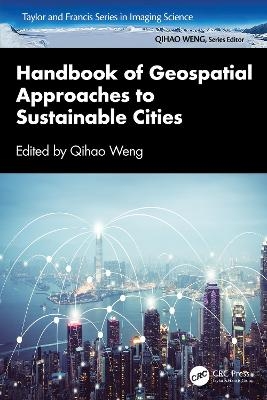
Handbook of Geospatial Approaches to Sustainable Cities
CRC Press (Verlag)
978-1-032-15481-7 (ISBN)
This comprehensive handbook presents the current state of knowledge on geospatial technologies, techniques, and methods that are imperative for providing solutions to sustainable cities. It addresses the role of geospatial big data and AI techniques and how they are applied when analyzing the sustainability of urban development, land use, urban planning, and resource management, as well as monitoring the impact urbanization has on the environment and the ecosystem. Taking an interdisciplinary approach to sustainable cities, and with contributions from renowned experts around the world, this holistic handbook is a toolbox for geospatial, urban, and sustainability professionals, the artificial intelligence community, and those who work in related fields.
Features:
Explores cutting-edge geospatial and AI techniques in support of efficient, resilient, digital, and smart cities
Bridges urban science and sustainability science via geospatial methods
Contributes to the efforts of GEO by addressing and exemplifying pertinent societal benefit areas and engagement priorities
Includes 16 case studies with a broad geographic scope that integrate societal needs with technological advances
Draws expertise in geospatial technology, big data, and artificial intelligence from leading experts in the world
This book is intended for researchers and scientists interested in learning techniques in GeoAI, including the technologies for collecting, analyzing, managing, processing, and visualizing geospatial datasets.
Qihao Weng, a Foreign Member of The Academy of Europe (Academia Europaea) and a Fellow of IEEE, AAAS, AAG, ASPRS, and AAIA, is currently a Chair Professor at the Hong Kong Polytechnic University and has worked as the Director of the Center for Urban and Environmental Change and a Professor of Geography at Indiana State University, 2001–2021, and a Senior Fellow at the National Aeronautics and Space Administration from 2008 to 2009. He received his Ph.D. in geography from the University of Georgia in 1999. Weng is the Lead of GEO Global Urban Observation and Information Initiative, 2012–2022, and an Editor-in-Chief of ISPRS Journal of Photogrammetry and Remote Sensing. Additionally, he serves as the Series Editor of Taylor & Francis Series in Remote Sensing Applications, and Taylor & Francis Series in Imaging Science. Weng has been the Organizer and Program Committee Chair of the biennial IEEE/ISPRS/GEO sponsored International Workshop on Earth Observation and Remote Sensing Applications conference series since 2008; a National Director of American Society for Photogrammetry and Remote Sensing from 2007 to 2010; and a panelist of U.S. DOE’s Cool Roofs Roadmap and Strategy in 2010. Cheolhee Yoo is currently a Research Assistant Professor at the Hong Kong Polytechnic University. He earned his Bachelor of Engineering and Ph.D. from the Department of Urban and Environmental Engineering at the Ulsan National Institute of Science and Technology (UNIST), South Korea, in 2017 and 2022, respectively. In 2019, he further expanded his research experience as a research intern at the RIKEN Center for Advanced Intelligence Project (AIP) in Japan. Following the completion of his doctoral studies, Dr. Yoo served as a Postdoctoral Fellow at the Hong Kong Polytechnic University from April to September 2022. He is currently an Editorial Board Member of the ISPRS Journal of Photogrammetry and Remote Sensing and GIScience & Remote Sensing.
Part 1: Artificial Intelligence and Big Data Analytics: Needs and Requirements. 1. Sensing Urban Physical Environment with GeoAI and Street-level Imagery. 2. Geospatial Big Data for Urban Sustainability Science. 3. Urban Flooding Monitoring and Management in Geospatial Perspective: Data, Techniques, and Platforms. Part 2: Geospatial Techniques for Renewable Cities. 4. Assessing Sustainability in China's Resource-Based Cities: Leveraging Remote Sensing Techniques for Evaluating Environment-related SDG Progress. 5. Urban Green Space Maps Based on GeoAI. 6. Contrasting Pattern of Urban Expansion and Urban Land-use Intensification of Global Megacities Using Nighttime Light Time Series Data. 7. The Potential of Nature-Based Solutions in Urban Heat Mitigation and Building Energy Savings. Part 3: Geospatial Techniques for Resilient Cities. 8. GeoAI for High-Resolution Urban Air Temperature Estimation and Urban Heat Island Monitoring. 9. Satellite-based Assessment of Urban Thermal Environments. 10. Urban Air Pollution Mitigation for Sustainable Cities: Observation, Modelling, and Control Strategies. 11. Geospatial Analysis of Emerging Drought Risk in a Warming Climate. 12. Urban Summer Air Temperature Forecasting through a Fusion of a Numerical Weather Prediction Model with Machine Learning. Part 4: Digital Cities. 13. GIS-based Modeling for Estimating Urban Carbon Emissions. 14. The Relationship Between Visual Space and Elders’ Mental Health Within 15-minute Life Circles Using SVIs-A Case Study Of Beijing. 15. Comparisons of Deep Learning Models for Dynamic Local Climate Zone Mapping. 16. The Potential Diffusion and Economic Impacts of Private Autonomous Vehicles: A Spatial Agent-based Model
| Erscheinungsdatum | 21.04.2024 |
|---|---|
| Reihe/Serie | Imaging Science |
| Zusatzinfo | 35 Tables, black and white; 74 Line drawings, color; 7 Line drawings, black and white; 41 Halftones, color; 115 Illustrations, color; 7 Illustrations, black and white |
| Verlagsort | London |
| Sprache | englisch |
| Maße | 156 x 234 mm |
| Gewicht | 720 g |
| Themenwelt | Naturwissenschaften ► Biologie ► Ökologie / Naturschutz |
| Naturwissenschaften ► Geowissenschaften ► Geografie / Kartografie | |
| Naturwissenschaften ► Geowissenschaften ► Geologie | |
| Technik ► Architektur | |
| Technik ► Umwelttechnik / Biotechnologie | |
| ISBN-10 | 1-032-15481-0 / 1032154810 |
| ISBN-13 | 978-1-032-15481-7 / 9781032154817 |
| Zustand | Neuware |
| Haben Sie eine Frage zum Produkt? |
aus dem Bereich


